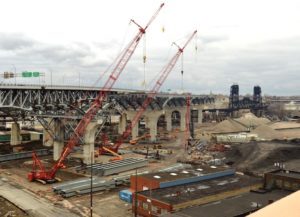
The legislature in Ohio is considering an amendment to their current Prompt Payment Act. The amendment would give property owners 35 days to pay prime/general contractors on private projects. The current law already protects subcontractors and material suppliers. Currently, GCs on private projects have 10 days to pay subs and suppliers after receiving payment from the property owner. The current law also gives protection to all parties on public projects.
On public projects, owners currently have 30 days to pay GCs, who then have 10 days to pay their suppliers.
2020 Update: Hearings on the amendment
The Ohio Legislature’s Commerce and Labor Committee has held four hearings on the amendment between November 2019 and May 2020.
Six construction organizations testified in support of the bill at those hearings, including the Construction Employers Association, Mechanical Contractors Association of Ohio, Ohio Roofing Contractors Association (ORCA), and Ohio Masonry Association, Farber Corporation & Mechanical Contractors Association of Ohio, and the Associated General Contractors of Ohio (AGC). All spoke in support of the proposed bill.
In a letter to the committee chairwoman, Fred Horner, president of ORCA, wrote “Anything that the General Assembly can do right now to speed payments to contractors and suppliers for the work they have performed will provide much needed help to our members, who are predominately local small businesses.”
It’s no secret that construction payments take a long time to move from the property owner down the chain of parties on a project.
Horner’s letter continued,” When the contractor at the top of the chain has to wait for months to be paid by a private owner, that means we are waiting too. In the meantime, we all need to pay our employees, our mortgages, our equipment providers and our utilities. We have more expenses now than ever before while we are also providing additional safety and sanitation equipment on our projects.”
In her testimony Andrea Ashley, VP of Government Relations at the Ohio chapter of the AGC, highlighted the benefits of existing law. But she also wrote about the need to address missing pieces of Ohio’s current prompt payment statutes.
“The Ohio Revised Code contains several prompt pay laws,” Ms. Ashley wrote. “Ohio has a Prompt Pay Act that requires a contractor to make timely payments to subcontractors on both public and private construction projects. Laws also exist for the prompt payment of contractors by public owners. Notably missing is a statute requiring prompt payment from a private owner to a contractor once a request for payment is made, which H.B. 380 addresses.”
Ohio’s Prompt Payment amendment
The goal of the legislation is “to amend section 4113.61 of the Revised Code to require owners of construction projects to pay a contractor within thirty-five days of receiving a request for payment. “
Here’s the main section of the amendment as proposed:
Sec. 4113.61. (A)(1) If a contractor submits a written request for payment to an owner for an amount that is allowed to the contractor under a contract for properly performed work or furnished materials, the owner shall pay the amount to the contractor, less any amount withheld as authorized by law, within thirty-five days after receiving the request. The owner may reduce the amount paid by any retainage provision contained in the contract, invoice, or purchase order between the owner and contractor, and may withhold amounts that may be necessary to resolve disputed liens or claims involving the work or labor performed or material furnished by the contractor.
If the owner fails to comply with division (A)(1) of this section, the owner shall pay the contractor, in addition to the payment due, interest in the amount of eighteen per cent per annum of the payment due, beginning on the thirty-sixth day following the receipt of the payment request from the contractor to the owner ending on the date of full payment of the payment due plus interest to the contractor.
What the amendment means
Here’s a simplified translation:
When the owner receives an invoice or pay application from the GC on a project, the owner will have 35 days to submit payment. The owner can withhold retainage from the payment. They are allowed to withhold money in the event of a dispute over the work, or to resolve a lien claim.
If the owner doesn’t pay within 35 days, they should also pay interest of 18% per year on that amount.
Further down, the amendment extends some other provisions of the current Act to private projects as well. If the owner doesn’t make payment within 30 days after it’s due, the law would allow GCs to file a civil claim for the payment amount, interest, and attorney fees.
Even if they do approve the amendment, Ohio’s prompt payment requirements would be less strict than other states. Nevada’s Prompt Payment laws require the owner to pay the prime within 21 days. Florida’s law gives owners 14 days to pay on private projects.
Everyone benefits from prompt payment
General contractors wouldn’t be the only beneficiaries under the new rule. Requiring fast payments to GCs also has trickle-down benefit to subcontractors and suppliers.
Consider this: Under the current Prompt Payment Act in Ohio, GCs have 10 days to pay immediate subcontractors after they receive payment from the owner. But there’s currently no law requiring the owner to pay GCs within a specific time frame. So subs and suppliers could still have a long time to wait. The new law would basically guarantee first-tier subcontractors payment within 45 days from the time the owner receives an invoice from the GC.
Faster payments for everyone on a construction project? What’s not to support?